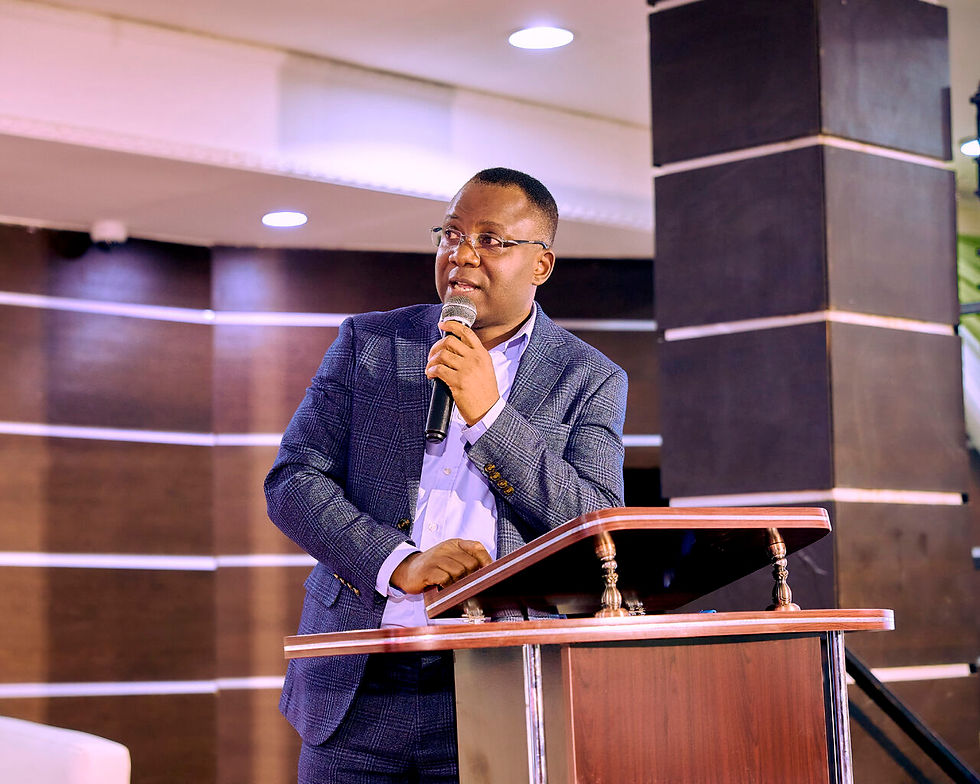AfroChampions need Africapitalism
- Kenneth Amaeshi
- Nov 6, 2021
- 5 min read
The African Union is keen to promote economic development in Africa. One way they have chosen to do this is through the creation of the African Continental Free Trade Area (AfCFTA), which is simply a mechanism to dismantle trade barriers and bottlenecks and enhance intra-continent trade. AfCFTA is made up of 54 out of 55 member countries in Africa and is “…the largest trade area in the world in terms of participating countries since the formation of the World Trade Organization”. This intra-continent trade primarily assumes that African countries are able to source locally and produce most of the things they need. This assumption also implies that the necessary businesses and entrepreneurs – especially African businesses and entrepreneurs – are standing by to exploit the opportunity. Unfortunately, these assumptions appear unfounded.
As has been recognised by the African Union, AfCTA requires some big indigenous businesses to be effective. This is not a completely new approach. Many of the Multinational Enterprises (MNEs) in the world today, have at some point been supported by governments and nation states. However, African Multinational Enterprises (AFMNEs) are very few in a space where number and size count. That is why the African Union is keen to promote the AfroChampions Initiative, which has been described as “a project that seeks to mobilise investment funds (about USD1tr by 2030) to help give rise to African economic champions”.
According to The Africa Report, the AfroChampions Initiative which is co-chaired by former South African President Thabo Mbeki and Nigerian businessman Aliko Dangote, brings together a range of business and political figures including: Togolese Gervais Djondo, co-founder of Ecobank and founder of Asky Airlines, the former Nigerian President Olusegun Obasanjo, Mali’s Samba Bathily, CEO of Africa Development Solutions, an industrial and financial group, Egyptian Naguib Sawiris, Chairman of Orascom, Cameroonian Paul Fokam, Chairman and CEO of Afriland First Group, Jean-Louis Billon, former CEO of Ivorian industrial group SIFCA and former Minister of Commerce of Côte d’Ivoire.
It is anticipated that the AfroChampions will be big and able to create enabling ecosystems to support and orchestrate the emergence of Small and Medium sized Enterprises (SMEs) who are known to be major contributors to sustainable socio-economic development through employment and other value creation services and activities.
Given the goal of the African Union to promote and support businesses that would contribute to sustainable socio-economic development in Africa, it only makes sense to ensure that these businesses also adopt and play by an economic philosophy that fits this agenda. It is one thing to promote these businesses, and another thing to ensure they are not derailed by the dangerous and selfish pursuit of profit to the detriment of the continent. In other words, these businesses need to be steered in such a way that they take their role in and their relationship with Africa beyond mere lips service.
This is where Africapitalism comes, as a new economic philosophy for Africa, and a possible business philosophy for AfroChampions.
What is Africapitalism?
Capitalism has not always worked for the interest of society as it should be. Hence the many efforts to re-align capitalism to societal needs (e.g. inclusive capitalism, progressive capitalism, responsible capitalism, sustainable capitalism, et cetera). Arguably Africapitalism draws from these progressive contemporary movements as the private sector’s commitment to the socio-economic development of Africa (Elumelu, 2012). According to Amaeshi and Idemudia (2015) Africapitalism, as an idea and a discourse, is underpinned by values, which reflect the spirit of long-termism and inclusion, such as the:
1. Sense of Progress and Prosperity: the combination of financial profitability and social wealth.
2. Sense of Parity and Inclusion: the recognition that the benefits of progress and prosperity need to be equitably shared.
3. Sense of Peace and Harmony: the view that the simultaneous pursuit of profit and social wealth is primarily a quest for balance, harmony, and peace – “…a process of achieving human development …in an inclusive, connected, equitable, prudent, and secure manner” (Gladwin et al., 1995:878 – emphasis in original).
4. Sense of Place and Belonging: an understanding of Africa primarily as a place (and not necessarily as a market) with meaning and value to people’s identities; a form of entrepreneurship, which seeks to meet Africa where the continent is in her development path.
As an idea, Africapitalism is arguably an imaginative articulation of a possible face of capitalism in Africa, which could be extended to other parts of the world. It is a discourse to galvanise a movement, which will ultimately change the practice of capitalism in Africa. Positioned as such, Africapitalism becomes an aspiration for Africa’s renaissance – i.e. a force for change. It challenges the status quo – i.e. capitalism in Africa – which has not transformed Africa. The problem here is not necessarily the spirit of capitalism, as the harbinger of human freedom and economic emancipation, but the inherited form of capitalism practised in Africa, which is often at variance with the socio-economic development of the continent. This misalignment invariably creates lopsided outcomes – e.g. economic banditry, corruption, inequality, poverty, et cetera – which the Sustainable Development Goals (SDGs) seek to address in Africa. In that regard, Africapitalism is a call for the private sector in Africa, especially the Multinational Enterprises, to contribute to the realisation of the SDGs, by taking into considerations the unique circumstances of the continent.
However, the question remains, how can Africapitalism, as a discourse, be translated into practice?
Translating Africapitalism discourse into practice
Drawing from the extant management and organisation literature, empirical evidence suggests that the translation of any discourse into practice tends to follow some similar pathways. A discourse is likely to be adopted by actors (a) whose purpose of being aligns with the discourse (b) who can see value in exploring the discourse (i.e. potentials) and (c) have the power to protect and explore the identified potentials enabled by the discourse. In addition, alignment with purpose, identification of potentials, and the power to protect and exploit the potentials are not sufficient. They are all strengthened with (d) the right policies and processes, which in in turn inform (e) the appropriate organisational practices.
Once an organisation’s purpose is shaped, the organisation can explore potentials through that lens. When potentials are explored and considered, the next thing is to ensure the organisation has the capability to protect and harness the potentials. That is actually what is referred to here as power – i.e. the power to protect and explore. This power can also be how the organisation influences others as much as how the organisation is influenced by others. Once the purpose, potentials, and power issues are sorted, the organisation needs to stabilise things through appropriate policies and processes. These should act as the nut and bolts to secure the identified opportunities and power aligned to the purpose of the organisation. The policies and processes will in turn inform and shape everyday organisational practices and routines.

The same thinking and strategies can be applied to translating Africapitalism discourse into practice, as illustrated in the highlighted schematic. In other words, the four key principles of Africapitalism highlighted above need to fit with the AfroChampions’ purpose of being in business. They can also shape the purpose of their being in business – assuming they want to re-articulate and re-align their purpose of being.
Conclusion
The emphasis on AfroChampions is a good idea. However, it needs a grounded and contextualised business philosophy to be of immense benefit to Africa, which Africapitalism provides. Notwithstanding, as Ferns and Amaeshi (2017) have argued, business elites can only save Africa if Africa’s wealthiest businesspeople are able to deploy effective strategies to enable them effect social change and drive economic growth. The framework provided here in translating Africapitalism discourse into practice becomes very useful and practical.







Comments